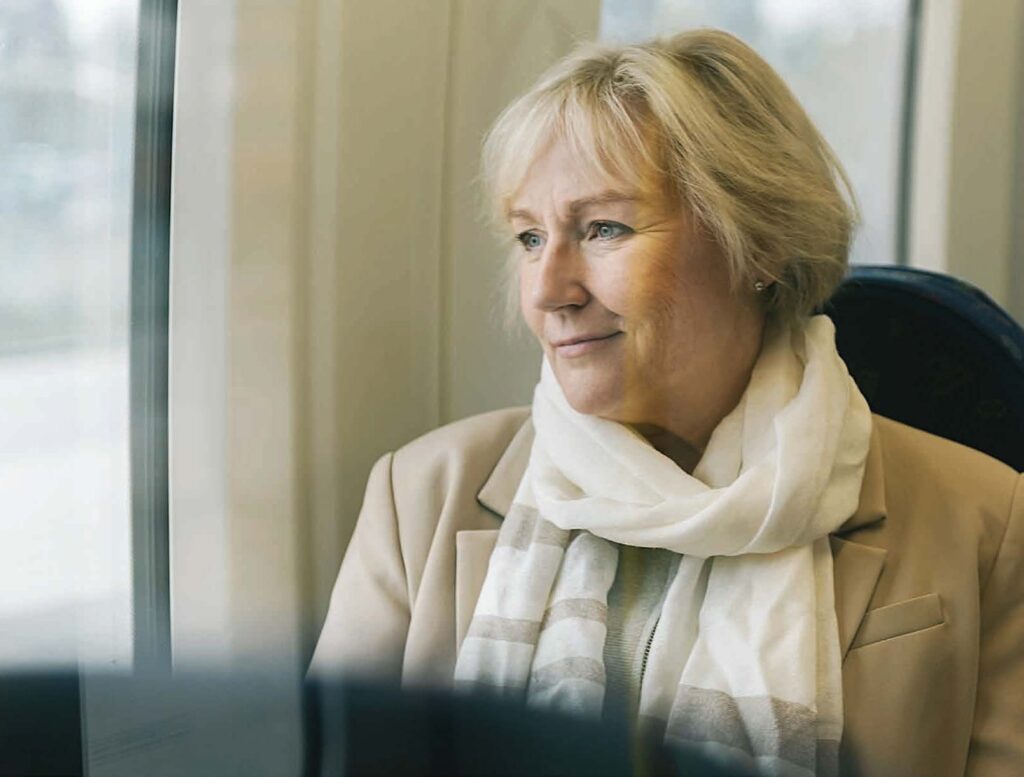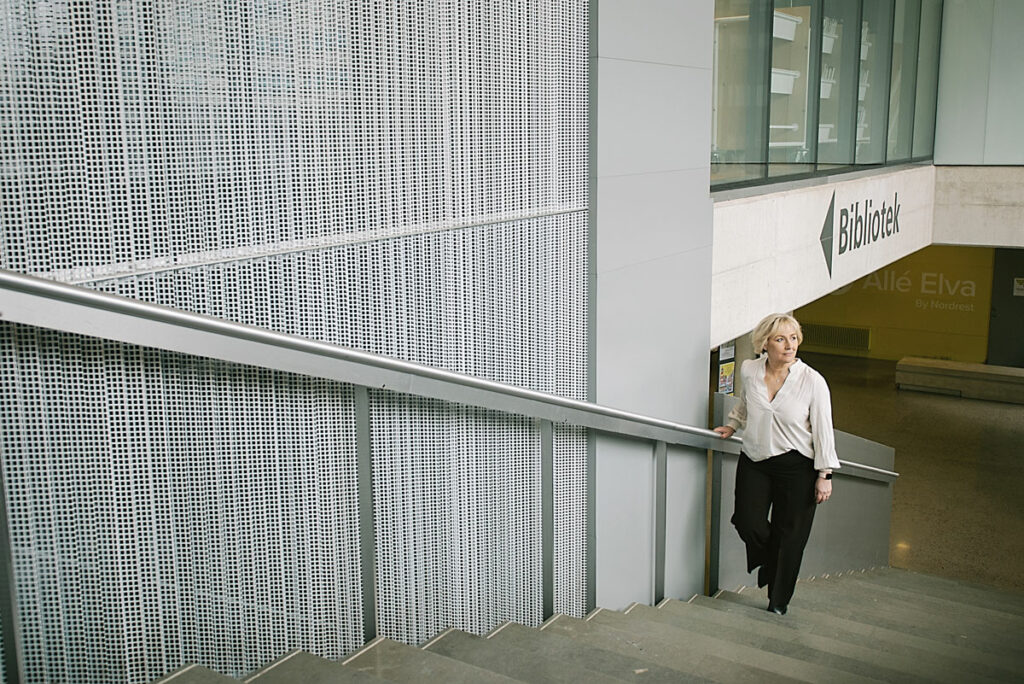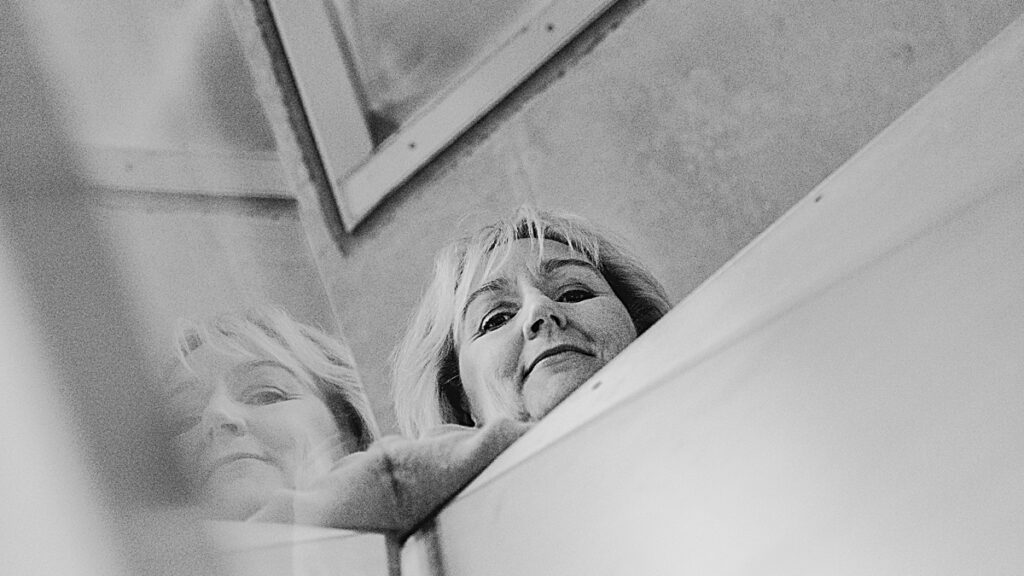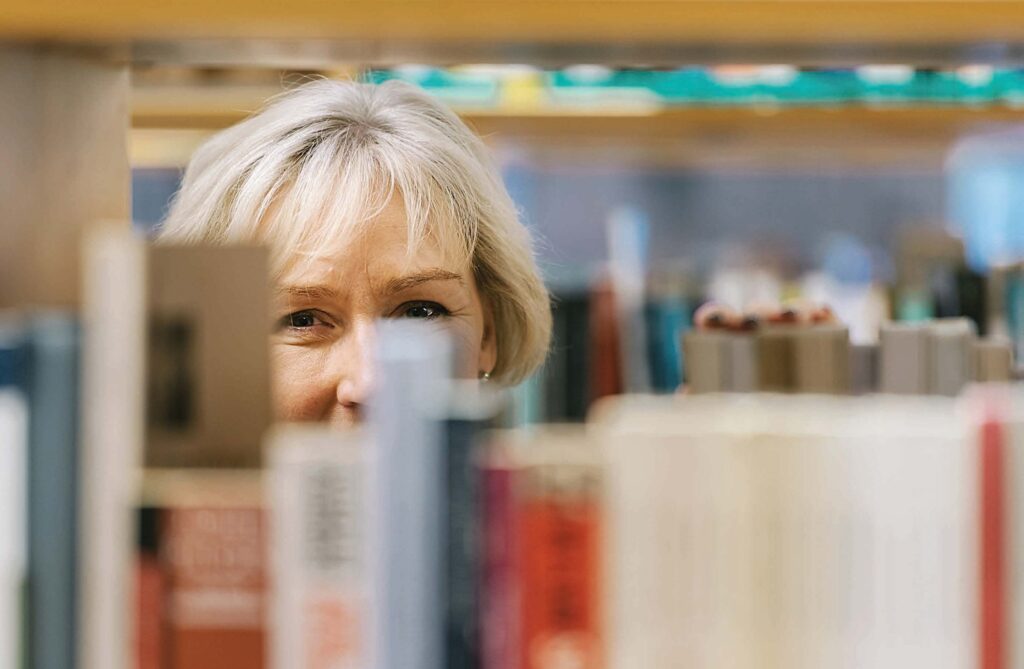Swift development is needed to cope with everything from battery production, electrification, and new materials for the production and distribution of hydrogen. In her role as Governor of Västerbotten County, Helene Hellmark Knutsson faces ever tougher demands to increase the pace of transition and with that comes the need for new knowledge. Nowadays, she rarely needs to convince people that knowledge needs to be developed in collaboration; instead, the discussions concern how this should be done – the actual doing.
Helene Hellmark Knutsson: The tracks must be laid while the trains run!
Helene Hellmark Knutsson’s interest in questions of collaboration between academia and practice spans many sectors and issues. During our conversation she often returns to the importance of understanding the roles and perspectives of different actors. Her experience ranges from trade union work and her time serving as a county councillor in Stockholm, to her years as Minister for Higher Education and Research, when she was behind the research and innovation bill titled “Knowledge in collaboration – for societal challenges and enhanced competitiveness”.
In her current role as County Governor of Västerbotten County, issues of sustainable regional development, not least through private–public partnerships, are high on the agenda. One example is her involvement in the SustainGov innovation programme, which involves academia, the public sector, and other organisations with the ambition of developing long-term sustainable solutions at system and community level. It is telling that we meet on a station platform, as Helene is often on the road in her everyday life. As a weekly commuter between Stockholm and Umeå, travelling is a normal part of her life that also provides opportunities to get involved in initiatives that are not restricted geographically.


Sustainability and freedom
The view of collaboration – what it means and how it can be implemented – must be broadened, Helene stresses. Complex societal challenges can only be met through collaboration across sectoral boundaries. The in in the “Knowledge in collaboration” research bill symbolised precisely this – that knowledge development must take place through collaboration that cuts across sectors, disciplines, and national borders.
Irrespective of the political flavours of the various governments, recent research bills have all highlighted collaboration as a means of promoting innovation and society’s knowledge supply. However, the move towards greater collaboration should not be understood as an attempt to control research content. Helene underscores how important it is that policy creates space for open, long-term research programmes that give higher education institutions the opportunity to determine and develop their activities themselves. Politicians should not dictate the focus of research or the areas in which the Swedish research landscape should develop cutting-edge knowledge. Yet, she believes that policy can encourage meetings across boundaries to promote the transfer of knowledge between academia and practice. On the one hand it involves developing an understanding of each other and, on the other, learning from each other. Respect and trust in each other’s work can only be developed by meeting and engaging in dialogue. Helene gives several examples of how she as a minister sought dialogue with researchers and other stakeholders, and how respect and mutual trust were built up over time.

Helene is also critical of the fact that we often tend to categorise basic research as something completely separate from applied research. Major discoveries and breakthroughs can come from all types of research, and questions worth investigating can also come from the outside. New, different questions can be asked in an encounter with practitioners, and these may give rise to new research projects.
In-depth knowledge of a particular research topic is often initiated from outside. There’s often a belief that only researchers can explore subjects in depth, but I think that is misguided.
Helene reminds us that not only researchers but also many others want to immerse themselves in subjects and make an impact in society.
From competitors to complements
Helene emphasises the productiveness of seeing the higher education sector as a whole that encompasses different missions and roles. Such an approach may for instance mean that not all higher education institutions should necessarily strive to obtain university status nor regarded it as the token of utmost success. Different higher education institutions complement each other and together they can help to achieve Sweden’s goals to be a knowledge nation with enhanced competitiveness.
Regarding each other as complements is also fruitful when it comes to the relationship between academia and practice. Helene believes that the challenge ahead lies in developing methods that draw on everyone’s knowledge, so that collaboration is deep and leads to new knowledge. It is about building structures that enable iterative learning processes where participants continuously check, follow up, and ensure that they are on the right track.

For collaboration to become more than just talk, it is therefore important that everyone takes responsibility for how they can contribute to solving problems based on their specific roles and with their different forms of knowledge.
A Knowledge Foundation for the older universities
Research policy requires an understanding of what constitutes a good research environment, and how these can be established and developed. Helene feels that there is a more pronounced, direct desire to engage in projects and contexts that go beyond the academic spaces at many of the smaller and younger higher education institutions. There is also both a greater interest in doing things differently and the opportunity to jump on new initiatives. According to Helene, the idea of KK environments (KK-miljöer) – where research, education, and collaboration form a whole – is also the way forward to being competitive. Sweden would benefit from developing more environments that promote knowledge transfer between academia and practice.

We need a Knowledge Foundation for the old universities, which can act as a lubricant for collaboration. Research goes hand in hand with education.
At the larger, older universities the focus is more intradisciplinary, and the path to new ways of working and methods seems longer. The idea that individual researchers’ freedom is paramount still prevails at the older universities. In such contexts, collaboration may even be regarded as somewhat opportunistic, as if researchers who engage in outreach activities and try to disseminate research results in a broader context want to gain popularity points.
The old research system in Sweden was built to protect the freedom and funding of individual professors. That’s why the money went straight to the faculties, and that’s still the case at the older universities. Few strategic trade-offs are made centrally.
Today, higher education institutions must create space for innovation and invest in a range of researchers with perhaps diverse ideas and perspectives to develop knowledge for the future.
Lifelong, countrywide, worldwide!
Academia needs to work together with the rest of society – also as far as education is concerned. Students are an underutilised group when it comes to finding ways of disseminating knowledge from universities and university colleges to different parts of society. Politicians should of course not micromanage education, Helene emphasises, but she notes that contact points between society and academia are needed, and that there should be ongoing dialogue about education. This is a requirement for contributing to society’s knowledge supply as well as lifelong learning.

People must be able to develop during their working lives. The time when you had the same job for 40, 45 years is gone, says Helene. We therefore need to offer opportunities for further development, for example by offering teacher training programmes for engineers. The right conditions need to be created to transition and meet complex societal challenges.
It is unreasonable that you should educate yourself for three or five years at the beginning of your life, and then be competitive on the labour market until the age of 67, 68, 69. Very few people can do that; you need to top up.
There is no reason, Helene says, to have training that is neither used nor in demand. Individuals need to feel needed. It also becomes problematic if there is too much of a one-sided political focus on all individuals obtaining academic degrees. Regarding a degree as the ultimate proof of an equitable society is a fallacy. We need to value different types of knowledge and skills more.
An formative democracy
It is through the humanities and social sciences that we understand our society, where we are, and how to find our way forward. Without this knowledge it is easy to get lost. Higher education must therefore also provide opportunities for students to self-cultivate and develop into critical thinkers and reflective human beings.

We also need researchers with the will, strength, and capacity to actively participate in public debate. There is a long list of infected issues, where researchers can contribute scientific knowledge and greater understanding, and so reduce polarisation. Helene mentions Sami rights and reindeer husbandry, as well as issues linked to energy supply and the importance of Norrland (the northern part of Sweden) in ensuring that Swedish households have electricity. Hatred and threats against researchers must be taken seriously, not least to safeguard an open, democratic society – something that we never thought we would have to defend just a few years ago, says Helene.
In questions that are contentious, debate and discussion risk leading to greater polarisation. Research can contribute to these debates by providing knowledge and other perspectives without the risk of increased polarisation. But then more collaboration is needed so that different groups can learn from each other.
The active participation of researchers in the public debate is closely interwoven with public education – the foundation of society. Research, which all of us help to fund, must therefore be disseminated to the masses. The thresholds should be low, Helene underlines. She gives several examples: It can be anything from short online courses to open lectures. It is an important democratic principle that all people have the right to access knowledge and to learn and improve. This also requires teaching and research initiatives throughout our country – it is the only way to ensure that lifelong learning is possible.
A strong society relies on an educated population, strong grassroots movements, as well as people’s ability to critically examine, be empowered, and influence their own situations.
This text is translated from Swedish. Original text: Maria Grafström and Anna Jonsson. Photos: Sebastian Borg.
This article is part of the book “The Nuances of Knowledge – Stories About Collaboration”. The book is based on inspiring interviews with nine remarkable people who have managed to break down barriers between research and practice.

